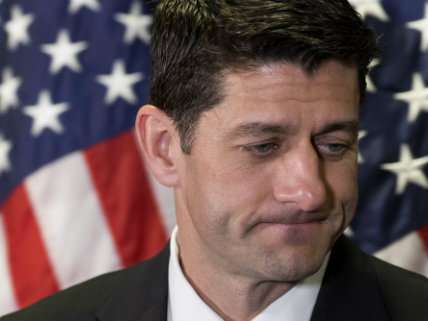Paul Ryan Calls Trump's Judge Remark Racist, Continues to Endorse Trump Anyway
House Speaker calls Trump's remarks about a Trump U judge "indefensible," but says he still has common ground with the presumptive GOP nominee.

Paul Ryan appears to believe that it is acceptable and even desirable for an individual who makes indefensibly racist remarks to occupy the White House. This is what a political party looks like in meltdown.
At a press event this morning, Speaker of the House Paul Ryan, who last week endorsed his party's presumptive nominee, Donald Trump, refused to defend Trump's recent remarks attacking a federal judge over his ethnicity.
Trump has repeatedly insisted that U.S. District Judge Gonzalo Curiel, who is presiding over a class action suit against the Trump University real estate sales program, is biased against Trump because of his Mexican heritage, and Trump's stated intention to build a southern border wall. Curiel was born in Indiana after his parents immigrated from Mexico.
Ryan said that Trump's remarks about the judge were "the textbook definition of a racist comment," and said that they should be "absolutely disavowed."
But he also indicated that he would not rescind his endorsement. "Do I think Hillary Clinton is the answer? No I do not," he said, claiming, once again, that he shared Trump's policy preference. "I believe that we have more common ground on the policy issues of the day and we have more likelihood of getting our policies enacted with him than we do with her."
Just to be clear, then, here is what is going on: Paul Ryan—the top Republican in the House, the Chairman of the convention where Trump is set to be nominated, arguably the most influential party's most influential elected leader—is literally saying that Donald Trump is acting like a racist, and making indefensible statements that must be disavowed, and also simultaneously saying that he continues to endorse Trump's candidacy. (Ryan has awkwardly tried to suggest that this does not necessarily make Trump himself a racist, merely that what Trump said was racist.)
So Ryan's position seems to be that the United States should elect someone who makes indefensible, racist remarks as president.
Ryan is trying to walk a careful line here, by endorsing Trump but forcefully criticizing the candidate's statements. But at a certain point, it becomes effectively impossible to have it both ways. The sheer absurdity of the position begins to reveal itself.
This is not a one-off event in Trump's history. Trump's candidacy has been defined by remarks like this from the outset; appeals to racism and nativism are the through line that connects his entire campaign.
By endorsing Trump—and yes, Ryan's staffers have said that it's an endorsement—Ryan is saying that the person responsible for making those remarks should be elevated to the most powerful political office in the country, and, indeed, the entire world.
At least one GOP politician, Sen. Lindsey Graham, has already raised the possibility of prominent Republicans un-endorsing Trump. That none have done so already is a sign of how maniacally resistant party leaders are of separating themselves from the nominee. That the idea has been raised, and that Trump has provoked such strong criticism from Ryan and other senior Republicans, is a sign of how mightily the party is straining to hold itself together.
This is what a failing political party looks like. The GOP is imploding before our very eyes, even as it attempts to maintain a false sense of unity. Ryan's struggle to maintain his own absurd position is illustrative of the struggle the entire Republican party faces right now.
The Speaker's stated belief that Trump's remarks are indefensible is difficult to square with his continued support for the candidate. One wonders what it would take for him, or the rest of the GOP, to say that Trump's candidacy is indefensible too.


Show Comments (77)